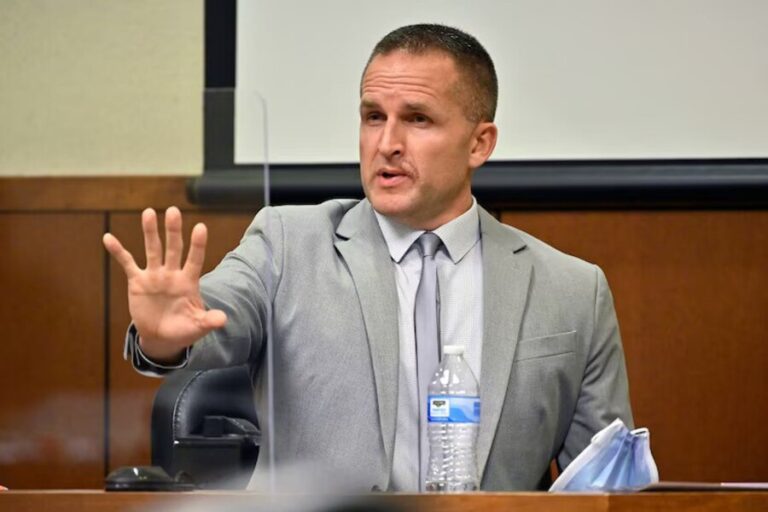Opening statements are set to begin Monday in the federal retrial of Brett Hankison, the former Louisville Metro Police Department (LMPD) officer accused of violating the civil rights of Breonna Taylor, her boyfriend, Kenneth Walker, and her neighbors during a 2020 police raid that led to Taylor’s death. This marks Hankison’s third trial, following a state trial where he was acquitted of wanton endangerment charges, and a previous federal trial that ended in a mistrial last year.
On the night of March 13, 2020, police officers executed a raid on Taylor’s apartment as part of a narcotics investigation. Hankison is accused of firing multiple rounds from outside the apartment, sending bullets into Taylor’s home and a neighboring unit. The incident led to Taylor’s death, sparking nationwide protests against police brutality and calls for justice.
Hankison was charged in a two-count indictment in August 2022 with civil rights violations, specifically for willfully depriving Taylor and Walker of their constitutional right to be free from unreasonable seizures, including the right to be free from a police officer’s use of unreasonable force. He was also charged with violating the rights of Taylor’s neighbors by using force that prosecutors argue “shocks the conscience.” Hankison has pleaded not guilty to all charges.
Jury selection began on Monday, with attorneys working through a pool of around 150 potential jurors to narrow it down to 16, including four alternates. The selection process is expected to take several days, given the high-profile nature of the case and the emotional weight it carries for the community.
Judge Rebecca Jennings, who is presiding over the trial, recently ruled in favor of the prosecution’s motion to exclude references to Hankison’s previous trials from this retrial. This means the jury will not hear about his acquittal on state charges in 2022 or the mistrial in the initial federal case. Judge Jennings, however, denied the prosecution’s attempt to introduce evidence of alleged past misconduct by Hankison while he was with the LMPD.
The federal courthouse in Louisville has once again become a focal point for supporters of Breonna Taylor and activists seeking justice. Bianca Austin, Taylor’s aunt, was seen at the courthouse, accompanied by activists who participated in protests following Taylor’s death.
“I’m going to be here every day because Breonna still hasn’t had justice,” said Kamal Wells, leader of Men Against Gun Violence. “There’s been no justice for Breonna.” Outside the courthouse, a small group of supporters chanted Taylor’s name as Hankison quietly entered the building, choosing not to speak to reporters.
In previous trials, Hankison admitted to firing his weapon from outside Taylor’s apartment but maintained that his actions were in response to perceived gunfire from inside, a claim that has been central to his defense. During the state trial in 2022, he was acquitted of wanton endangerment, a charge that stemmed from bullets entering a neighboring apartment. His attorneys argued that he was acting in defense of his fellow officers and had no intention to harm Taylor or her neighbors.
The federal charges are different, focusing on civil rights violations. Prosecutors will need to prove that Hankison’s actions were a willful deprivation of rights, a higher bar than the charges in the state trial. During the initial federal trial, jurors were unable to reach a unanimous verdict, resulting in a mistrial and setting the stage for this week’s proceedings.
For many, this trial is not just about Hankison’s conduct but about systemic issues within law enforcement. Breonna Taylor’s death became a rallying cry for the Black Lives Matter movement, highlighting the need for police reform and accountability. Activists, who have been vocal throughout the legal proceedings, continue to demand justice.
“As you see, people are coming — and they’re going to keep coming,” said activist Bruce Sweeney outside the courthouse. “We’re not going to stop until we get justice.”
The trial will likely focus on the events leading up to the raid, Hankison’s actions during the incident, and whether his decision to fire shots was a reasonable response. The prosecution is expected to argue that Hankison’s use of force was unjustified and reckless, endangering not only Taylor and Walker but also their neighbors. Defense attorneys will likely maintain that Hankison acted out of concern for officer safety, responding to what he perceived as a threat.
The case also underscores the difficulties in achieving accountability in cases involving law enforcement. Despite public outcry and multiple legal proceedings, no officer has yet been convicted in connection with Taylor’s death.
